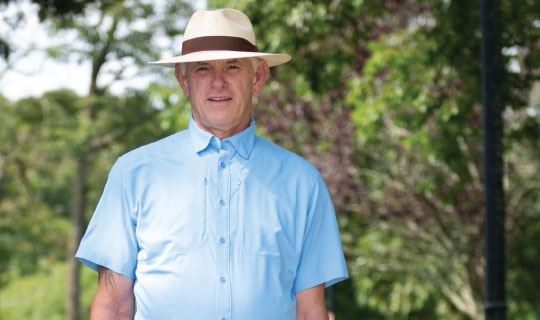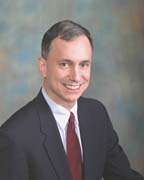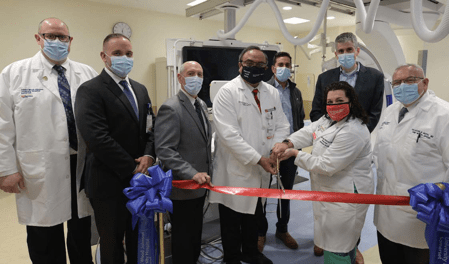“So many people had a hand in his survival. We could not be more grateful. We are very lucky and very blessed.”


Anthony Catanese, MD, a urologist at Robert Wood Johnson University Hospital (RWJUH) Somerset and a member of RWJBarnabas Health Medical Group, didn’t plan to save a life when he stepped out for a quick walk on March 30. But in a near miraculous sequence of events, his skills as an advanced cardiac life support instructor with experience resuscitating people in distress proved critical to 61-year-old Richard Smekal of Little Egg Harbor.
Exiting his office on Main Street in Somerville, Dr. Catanese was stunned to find Richard lying unconscious in the street not far from his door. The doctor instinctively rushed to the man’s side, quickly taking stock of multiple emergency priorities. First, Dr. Catanese stopped traffic to protect Richard from vehicles and asked a bystander to call 911 for emergency assistance. Then he turned to the form crumpled on the pavement.
The man’s pulse was slow at first—and then it stopped. Dr. Catanese knew this signaled cardiac arrest, an abrupt loss of heart function. Dr. Catanese immediately started performing cardiopulmonary resuscitation (CPR), repeatedly compressing the man’s chest to squeeze the heart and keep blood pumping through his body.
Richard, a crane operator for PSE&G, has no memory of what happened that day or the array of people in various roles who together saved his life. He had suffered a heart attack as he was working on an electrical pole and, while climbing into his utility truck, had collapsed onto the asphalt.
Although Dr. Catanese got to him first, police, EMTs from the Somerville Rescue Squad, paramedics from RWJBarnabas Health Mobile Health Services and Richard’s own crew foreman arrived soon after and took turns performing CPR. Richard’s heart kept stopping, and first responders had to use a defibrillator to shock it back to beating. Before the ambulance arrived, they had resuscitated him four times. He would have to be revived again on the way to the RWJUH Somerset Emergency Department (ED).
Dr. Catanese didn’t hold much hope that the man he’d tried to save would live. “Less than 15 percent of people who have cardiac arrest outside a hospital survive,” he says.
Critical Call
Once the ambulance headed to the hospital, Dr. Catanese called the ED. He knew from the pattern of Richard’s pulse that in addition to a heart blockage, the electrical system of Richard’s heart had been thrown into an abnormal rhythm. The doctors on call would need to know what they were facing.
Emergency medicine physician Lisa Ceppetelli, MD, took note and placed an external pacemaker on Richard’s chest as soon as he arrived, which helped regulate his heart’s electrical activity, a critical step.

After he was stabilized, Richard was rushed to the catheterization (“cath”) lab. There, interventional cardiologist Daniel Fung, MD, performed an emergency angioplasty in which he threaded a thin tube through a blood vessel to open up the blockage with a tiny balloon and placed a stent to keep the blood vessel open, restoring blood flow to Richard’s heart.
That’s where Richard was when his wife, Rosemary, arrived at the hospital “in panic mode,” she says. She and her sister had made a frantic drive from Lakewood after they got the news. “I cried the whole way,” Rosemary says.
Fight For Life
Richard was put on a ventilator and moved to intensive care, his condition still precarious. He also had a concussion from the fall and cognitive problems due to loss of oxygen. Rosemary felt more hopeful the following day when her husband opened his eyes and smiled at her.
Richard was soon transferred to Robert Wood Johnson University Hospital in New Brunswick for rehabilitation. Physical therapists gradually got him standing, then walking with the help of a walker, while speech therapists helped him learn to swallow and eat again after his intubation. A few days after his discharge on April 6, Richard was able to walk without assistance. He continued outpatient cardiac rehabilitation and cognitive therapy and is on his way to a full recovery.
Despite not remembering the incident or his time in the ICU, Richard understands how close he came to death, and the aftermath has been profoundly emotional. “I can’t tell you how many boxes of tissues I’ve gone through,” he says. Richard’s life has changed in fundamental ways. It’s not just that his diet “has done a 180,” he says, referring to the healthy foods he’s now eating. Says Rosemary, “The way we live now, everything revolves around enjoying life.”
“It’s really wonderful that he survived,” Dr. Catanese says. “But it’s a situation where many people did something. If anyone had been missing, it wouldn’t have worked.”
The Smekals reunited with the team that played a role in Richard’s care two weeks later to say thanks, and many shed a tear. “So many people had a hand in his survival,” says Rosemary. “We could not be more grateful. We are very lucky and very blessed.”
 Catheterization Lab's State-of-the-Art UpgradeOne of RWJUH Somerset’s three cardiac catheterization labs now offers the most advanced X-ray technology available for angioplasty and other catheterization-based cardiac procedures. Called Azurion with FlexArm, this image-guided therapy system provides 2-D and 3-D images with less radiation to the patient. The flexible arm moves around the patient’s body, reducing the need to reposition providers and equipment, and promises to make setting up and performing the procedure faster and more efficient. |
Whoever your heart beats for, our hearts beat for you. To connect with a top cardiovascular specialist at RWJUH Somerset, call 888-724-7123.